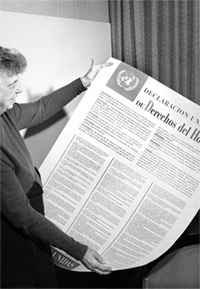The United Nations system

The United Nations was established in the aftermath of the Second World War. One of its key purposes is the promotion and protection of human rights and one of its earliest actions was to adopt the Universal Declaration of Human Rights (UDHR) in 1948. The UDHR expresses the rights to which everyone is entitled by virtue of being human. It consists of 30 articles which have been elaborated in subsequent legally binding international treaties, regional human rights instruments, national constitutions and laws.
This quote from Eleanor Roosevelt, Chairperson of the United Nations Human Rights Commission that drafted the UDHR, shows that it was always envisaged that human rights should become important in everyday life such as in our homes and in care settings:
“Where after all, do universal human rights begin? In small places, close to home – so close and so small that they cannot be seen on any maps of the world. Yet they are the world of the individual person; the neighborhood he lives in; the school or college he attends; the factory, farm or office where he works… unless these rights have meaning there, they have little meaning anywhere. Without concerted citizen action to uphold them close to home, we shall look in vain for progress in the larger world.”
Eleanor Roosevelt
International treaties and conventions are the agreements made between states. The agreements contain legal obligations for states and rights for individuals within that state.
The UK has signed up to, and ratified, many of these agreements (treaties) on international human rights law, including:
-
The International Convention on Economic, Social and Cultural Rights
-
The Convention on the Elimination of Discrimination Against Women
Each of these treaties is monitored by a committee of independent experts from around the world. The UK must report to each of these committees every four or five years on its compliance with the treaty. Others, such as civil society groups and national human rights institutions like the Scottish Human Rights Commission, can give the committees alternative reports on their assessment of the rights in the treaty.
The UK has also agreed to allow individuals or groups to submit petitions directly to the relevant treaty committees with regard to alleged human rights abuses under two of these treaties – the Convention on the Elimination of Discrimination Against Women and the Convention on the Rights of Persons with Disabilities. Anyone who wishes to submit a petition under either of these treaties would first have to have taken their complaint through all available channels in Scotland.
Nearly all of these treaties are relevant to older people. However, the full potential of these treaties to defend and uphold the rights of older persons has not been fully realised. One effort to bridge this gap is the United Nations Principles for Older Persons. These Principles, which are not themselves legally binding, are based on many of the treaties above. They contain 18 principles, grouped under five themes:
In the following section we describe some of the key human rights of older people and what they mean in practice in care home and care at home/housing support settings.

